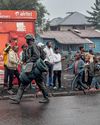
EVEN THE DAY BEFORE, the only people who knew exactly what was planned could be counted on the fingers of one hand. Israeli intelligence services had been deceived, or had failed to comprehend. Those who would take part, the militants of Hamas and some allied groups, did not yet know what they had been training for. To keep the secret, Yahya Sinwar, the head of Hamas in Gaza, had confided in three or four key lieutenants. Only they knew what was to come, and where, and when.
So on that Friday evening, in Rafah and Khan Younis, Tel Aviv and Sderot, in the kibbutzim of southern Israel, in Beit Lahia and Deiral Balah, life went on as usual. Only at 6.29 the next morning, when thousands of rockets launched from Gaza towards Israel across the lightening sky did anyone begin to suspect that this 7 October would be very different. Still, few anticipated the catastrophe it would bring, nor the year of crisis it would provoke.
Last weekend the regional war that so many have feared for so long was apparently closer than ever. More than 1,200 people, mostly civilians, died on 7 October. Of the 250 abducted that day by Hamas, half were released in a short-lived ceasefire in November and half of the remainder are thought to be dead. No one knows how many died in last Friday's massive strike in southern Beirut. More than 41,000 have been killed in Gaza, mostly civilians, one in 55 of the prewar population. More than 700 have died in Lebanon in the recent wave of Israeli attacks, including the leader of Hezbollah, Hassan Nasrallah.
When the sheer scale and brutality of the Hamas attack into Israel on 7 October became clear over the following days, it was obvious that Israel's response would be as unprecedented in scale and violence as the event that provoked it. From London, the big pessimistic picture seemed easy enough to paint: an ever-accelerating cycle of attack and retaliation that would eventually spread across the Middle East.
This story is from the October 04, 2024 edition of The Guardian Weekly.
Start your 7-day Magzter GOLD free trial to access thousands of curated premium stories, and 9,000+ magazines and newspapers.
Already a subscriber ? Sign In
This story is from the October 04, 2024 edition of The Guardian Weekly.
Start your 7-day Magzter GOLD free trial to access thousands of curated premium stories, and 9,000+ magazines and newspapers.
Already a subscriber? Sign In

What is DEI and why is Trump waging war against it?
When American voters headed to the ballot box in November, opinion polls suggested the cost of living, immigration and reproductive rights ranked among their biggest concerns.

Who are M23 rebels and why is there fighting in eastern DRC?
The armed group M23 and Rwandan soldiers entered the centre of Goma last Sunday after weeks of advancing on the main city in the Democratic Republic of the Congo's North Kivu province.

Aid distribution What Israel's ban on Unrwa may mean for Palestinians
Israel this week insisted it would not back down over its plan to close the Gaza operations of the United Nations Relief and Works Agency for Palestine Refugees (Unrwa), even though critics said the move would jeopardise urgent humanitarian aid efforts.

Anti-terror strategy failed to stop a killer
Southport attacker's lack of coherent ideology meant the Prevent scheme did not see him as a potential risk, exposing the need for reform
Last writes
Handwriting is disappearing - we are far more likely to use our hands to type or swipe than pick up a pen. But in the process are we in danger of losing cognitive skills, sensory experience and a connection to history?

I just want to hug those girls' Bittersweet joy and relief as freed soldiers return home
Nineteen-year-old Naama Levy became an indelible symbol of Hamas’s 7 October 2023 attack on Israel.

Eighty years after the liberation of Auschwitz, survivors call for courage amid the rise of hatred and antisemitism 'We must avoid the mistakes of the 1930s'
On a day of startling blue skies, Auschwitz survivors stood before princes and presidents on Monday to remind the world, perhaps for the final time, of the horrors they suffered there during one of the darkest moments of human history.

Davos lessons Trump's return heralds new era of harsh global competition
In the heady mountain air of Davos last week, away from the parties and the backslapping tech bros, another, more beleaguered crew touted their wares: the multilateralists.

Can the continent's publishing industry turn a page?
Tsitsi Dangarembga's Nervous Conditions, a novel about growing up in colonial Zimbabwe, is one of the most important works of 20th-century African literature and features on university curriculums across the UK.

Trump has arrived with abang-but can he follow through?
Little more than a week ago, Stewart Rhodes was serving an 18-year prison sentence for seditious conspiracy over his role in a deadly attack on the US Capitol.